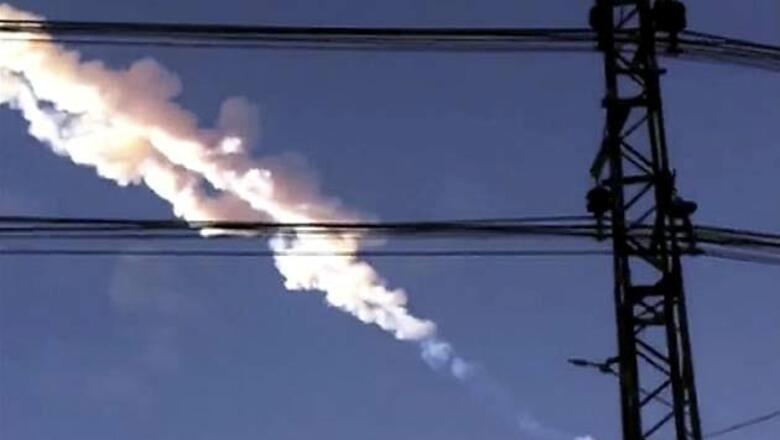
views
Moscow: A Russian health official says nearly 1,000 people have sought help for injuries after a meteor streaked through the sky and exploded Friday over Russia's Ural Mountains with the power of an atomic bomb. The sonic blast from the hurtling space rock shattered countless windows and deeply frightened thousands, with some elderly women declaring the world was coming to an end.
The meteor - estimated to be about 10 tons - entered the Earth's atmosphere at a hypersonic speed of at least 33,000 mph and shattered about 18-32 miles above the ground, the Russian Academy of Sciences said in a statement. It released the energy of several kilotons above the Chelyabinsk region, the academy said.
Chelyabinsk health chief Marina Moskvicheva, said Friday that 985 people in her city had asked for medical assistance. The Interfax news agency quoted her as saying 43 were hospitalized. Amateur video broadcast on Russian television showed an object speeding across the sky about 9:20 am local time, just after sunrise, leaving a thick white contrail and an intense flash.
"There was panic. People had no idea what was happening. Everyone was going around to people's houses to check if they were OK," said Sergey Hametov, a resident of Chelyabinsk, a city of 1 million about 930 miles east of Moscow. "We saw a big burst of light, then went outside to see what it was and we heard a really loud thundering sound," he told The Associated Press by telephone.
The explosions broke more than 1 million square feet of glass, city officials said. It was not immediately clear if any people were struck by space fragments. Another Chelyabinsk resident, Valya Kazakov, said some elderly women in his neighborhood started crying out that the world was ending.
City officials said 3,000 buildings in the city were damaged by the shock wave, including a zinc factory where part of the roof collapsed. Small pieces of space debris - usually parts of comets or asteroids - that are on a collision course with the Earth are called meteoroids. They become meteors when they enter the Earth's atmosphere. Most meteors burn up in the atmosphere, but if they survive the frictional heating and strike the surface of the Earth they are called meteorites.
Meteors typically cause sizeable sonic booms when they enter the atmosphere because they are traveling much faster than the speed of sound. Injuries on the scale reported Friday, however, are extraordinarily rare. The meteor hit less than a day before the asteroid 2012 DA14 is to make the closest recorded pass of an asteroid to the Earth - about 17,150 miles. But the European Space Agency in a tweet said its experts had determined there was no connection.
Some fragments fell in a reservoir outside the town of Cherbakul, the regional governor's office said, according to the ITAR-Tass. A 20-foot-wide crater was found in the same area, which could come from space fragments striking the ground, the news agency cited military spokesman Yaroslavl Roshchupkin as saying.
####




















Comments
0 comment